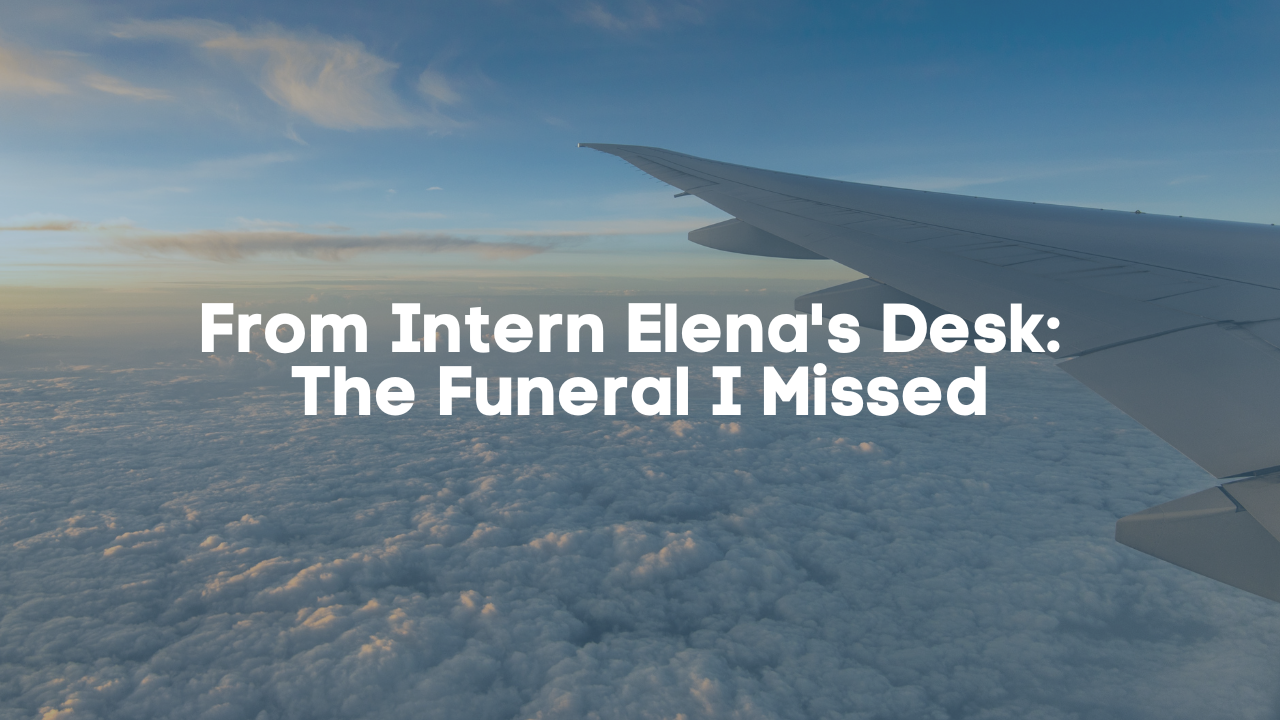From Intern Elena's Desk: The Funeral I Missed
Jul 27, 2025
Where Is the Funeral?
It’s such a simple question, asked softly, often without thinking. People mean well. They want to offer comfort.
But when someone asked me that, shortly after losing my aunt, whom I loved deeply, the answer stuck in my throat.
Where is the funeral?
“Abroad.”
Two syllables. So small, yet they carry the weight of a thousand unspoken sorrows.
Because when someone dies far from the land they called home, grief changes its shape. It fractures across time zones and borders. It is a grief no one really prepares you for: the grief of repatriation in a fractured world.
Repatriation is the process of returning a deceased loved one’s body to their country of origin, a final act of honoring heritage, culture, and tradition. For many immigrant and diasporic families, it is sacred. It is fulfilling promises made silently, paying respect to ancestors, resting the beloved where they belong.
But in today’s world, marked by political unrest, economic sanctions, closed borders, and travel restrictions, repatriation can feel like an impossible dream.
Because for many families, bodies do not get sent home.
Imagine this:
One for your loved ones dies in the U.S., but your family in Syria had hoped to bring them home, the soil they were born in.
Instead of attending and being present, you receive photos and short videos from relatives abroad. Small, flickering glimpses of a farewell you couldn’t attend.
The helpness felt watching those images on a phone, hands shaking, trying to be present, trying to grieve from a distance.
Back in Syria, thousands of miles away, life didn’t stop. The news still rolled on. Bills still needed to be paid.
But your grief — it sat heavy and invisible.
There were no casseroles left at the door.
No friends stopping by with hugs or soft words.
No community gatherings to share stories or hold memories.
Just you. And the haunting knowledge that your mourning was unseen, unshared.
This kind of situation happens all the time. And it's devastating.
It happened just this month.
Sulaimane “Sulay” Bangura was 26 years old when he died in a motorcycle crash in Durham, North Carolina. A beloved son, friend, and aspiring lawyer, he was less than a year from graduating from North Carolina Central University’s School of Law. As the child of immigrants from Sierra Leone, Sulay had dedicated his life to helping others—interviewing for internships, working in public service, and interning for N.C. Supreme Court Justice Anita Earls. He wanted to use the law to uplift those like his mother, whom he watched struggle as an immigrant in America.
And then, suddenly, he was gone.
The question came quickly: Where is the funeral?
The answer: “We’re trying to send him home.”
His family launched a GoFundMe to raise $35,000 to repatriate his body to Sierra Leone. Because for them, bringing Sulay home wasn’t just about geography. It was about love. Culture. Roots. It was about giving him the goodbye he deserved.
In Sulay’s story, we see what so many immigrant and diasporic families experience: the emotional, financial, and logistical weight of mourning across continents. And how communities come together in the face of it all, trying to make a fractured farewell whole.
This kind of grief is shaped by distance, but also by systems that do not always recognize it.
It carries guilt—-guilt that you could not afford to travel, guilt that paperwork and policies delayed the process, guilt that you had to stay behind for work, school, or your children. Guilt that your grief is trapped between two worlds, and neither of which can fully contain it.
But none of this guilt means your love was any less.
If anything, it means your love is so fierce, so deep, it continues searching for ways to say goodbye, even when the farewell happens somewhere you cannot be.
If your answer to “Where is the funeral?” is “abroad,” or “the body stayed here,”
I see you.
You are not grieving wrong. You are not less in your grief because you are far away or because the ceremony was held without you. You are not alone.
You can still honor your loved one here.
You can light a candle in their memory.
Write their name and pray for them.
Cook their favorite meal and share it in your own quiet way.
Speak to them in the language of your love, even if no one else hears.
Even when the goodbye happens somewhere else, or not at all, your grief lives here. Your love lives here. And they deserve space, attention, and care.
The world may not always understand this kind of loss, but it is real, profound, and deeply human.
You are carrying a grief that bridges continents, and you are not alone.
Join the Grieve Leave movement
Share your info to join our Grieve Leave community. You don’t want to miss anything!


